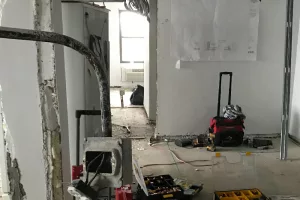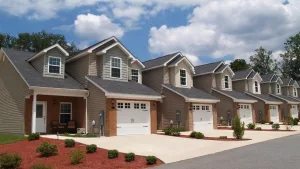Ultimate Guide About Cap Rate Calculator (2025)
Go Back To Previous PageJust over 44 million American households are renters. That means there are always millions of people looking for new rental properties and millions of opportunities for new property investors. If you’re considering investing in property, now’s a good time. One crucial factor to consider when investing in property is the property’s capitalization rate (cap rate). Luckily, you can use a cap rate calculator. How do you calculate the capitalization rate (also known as the cap rate)?
investors. If you’re considering investing in property, now’s a good time. One crucial factor to consider when investing in property is the property’s capitalization rate (cap rate). Luckily, you can use a cap rate calculator. How do you calculate the capitalization rate (also known as the cap rate)?
Essentially, the cap rate can be calculated by dividing a property’s net operating income by the investor’s cost basis in the property.
- The net operating income is gross rent minus expenses. For example, if a property generates $100,000 in gross revenue and has $30,000 in operating expenses, the NOI would be $70,000.
- The property’s cost basis is the purchase price, closing costs, and renovation costs.
But what is the cap rate, and why does it matter? Read on to learn the answers to your questions.
What Is a Cap Rate?
A cap rate is a shorthand for “capitalization rate.” It’s the introductory rate of return that a landlord or property owner could expect to get on their real estate property. In other words, it helps investors estimate the potential return on investment (ROI) before making a purchase.
The cap rate is a measure used in real estate to evaluate the potential return on an investment property. The percentage of the property’s value generated in income in a given year is an annual ROI.
It also helps investors determine risk. A high capitalization rate could indicate a risky property (though this isn’t always a bad thing).
The formula is Cap Rate = Net Operating Income / Cost Basis.
Net Operating Income (NOI) is calculated by subtracting all operating expenses from the property’s gross income. Operating expenses include property taxes, insurance, and other revenue streams.
To calculate a cap rate, divide the net operating income (NOI) by the property’s market value at the time of calculation. Net operating income is the income that the investor would have left over after deducting any operational expenses, such as insurance, taxes, repairs, and management fees, if they use a property manager. Look at it as your cash flows.
For example, let’s say you are considering purchasing a rental property for $500,000 that generates an NOI of $50,000 per year. The capitalization rate (cap rate) for this property is 10% ($50,000 / $500,000). This means the property is expected to generate a 10% annual return on your investment.
Cap rates aren’t static. They change as the property value and the operating costs of a rental property change. Therefore, while the value may increase, the repair and management costs are likely to increase as well. Investors need to use current information to find accurate cap rates.
Why Do They Matter?
Cap rates are helpful for would-be investors who are comparing different properties, especially if those properties are in other neighborhoods or cities. A higher cap rate indicates a higher potential return, while a lower one suggests a lower return. However, it’s essential to remember that the cap rate is just one factor to consider when evaluating an investment property. Therefore, other factors, such as location, market trends, and potential for appreciation, should also be taken into consideration.
You can examine average cap rates in various areas to determine where to invest, before narrowing down your options and selecting your ideal property.
Cap rates also make it easier to compare different types of investment properties. On paper, deciding if an apartment building or a single-family rental would be a better investment remains difficult. The apartment would make more monthly money, which may seem the obvious choice. However, when you examine the cap rate, you may find that the expenses and initial value aren’t worthwhile.
This calculation is imperfect and may require adjustments to account for other factors. However, it lets investors quickly compare properties and make informed investment decisions. Ultimately, using a Cap Rate Calculator helps make the difference between turning a great return on your investment or coming up short.
How Can it Help You?
Calculating the cap rate is not difficult. Once you know how to calculate this number, you may think that it would be pointless to use a calculator. However, if you’re a serious investor looking at multiple properties, a cap rate real estate calculator can help.
The calculator works for you quickly. You don’t have to analyze spreadsheets. Your calculations become more accurate because you eliminate the risk of human error. When you want to find the perfect investment property amongst several cable options, the cap rate calculator will help you make an intelligent choice.
What is a reasonable cap rate in 2023?
It’s challenging to answer this question definitively, as the real estate market changes annually and heavily depends on local factors. What some consider a reasonable rate today can differ three years from now. So you’ll need to research and carefully analyze the specific market you’re considering investing in.
When evaluating a potential investment’s performance, it is essential to monitor factors such as supply and demand, property values, market trends, interest rates, and rental costs. When considering a reasonable rate for 2023, consider all of these elements and industry benchmarks set by professionals in the sector.
What does a 7.5% cap rate mean?
A 7.5% cap rate is used to evaluate real estate investments and determine the return they will generate on their current value. It is calculated by dividing a given property’s net operating income (NOI) by its current market value and then multiplying the result by 100.
It’s a reasonable to good cap rate.
This means that potential investors can expect an average yearly return of 7.5%. This is true if net profits stay the same and the market value does not drop.
Consider factors that may cause fluctuations in your returns, such as changes in market conditions or tax rates. So you can make intelligent decisions when investing in commercial real estate property.
Start Investing in Property With a Cap Rate Calculator
If you’re not already using a cap rate calculator for your property investment needs, what’s holding you back? A cap rate calculator will make finding the best investment property a breeze without the need to do any math by hand.
Are you preparing to purchase a piece of real estate?
View our listings on NestApple to find the perfect property today.


